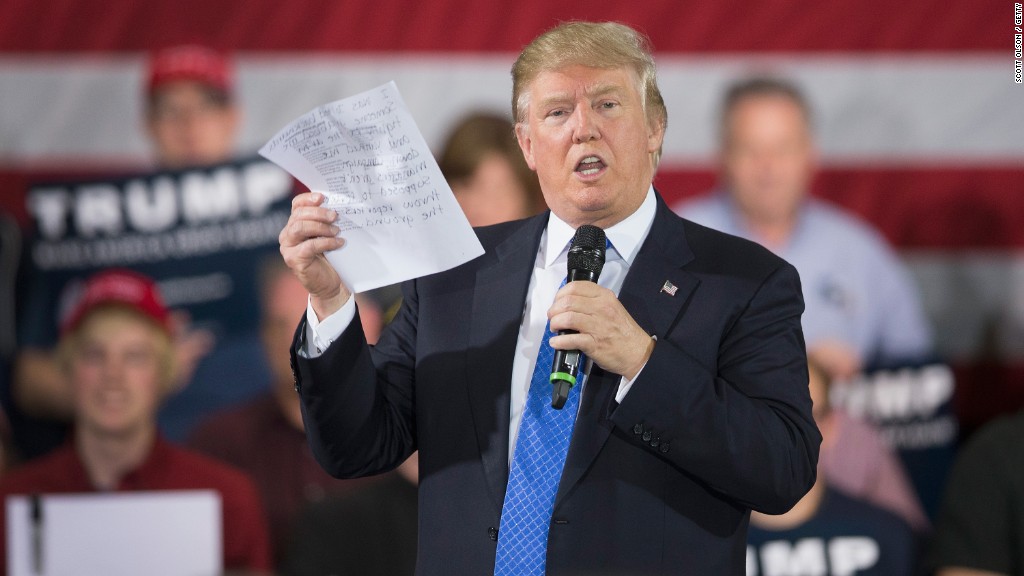
Donald Trump claims America is on the verge of a "very massive recession."
But don't worry, Trump says he can save the economy and get America out of debt. Just give him eight years in the White House and he'll make America's $19 trillion debt go away.
How? Trump wants to slash taxes and fix trade deals with China, Mexico and other nations.
"You have to do a tax cut. Because we're the highest-taxed nation in the world," Trump said in a recent interview with The Washington Post.
Experts say: Yeah right.
"It strikes me as wildly implausible at best," says economist Doug Holtz-Eakin, who is president of the right-leaning American Action Forum and a former head of the Congressional Budget Office.
Plans to reduce -- let alone eliminate -- the federal debt typically have three key components: RAISE taxes, cut spending and tweak Social Security and Medicare. Trump is talking about exactly the opposite when it comes to taxes, and he hasn't mentioned any of those other things except some very minor spending reductions.
Related: How America lost jobs to Mexico
Trump believes the U.S. is on the verge of economic disaster
Trump advises people to get their money out of the stock market.
"I think we're sitting on an economic bubble. A financial bubble," Trump told The WashPost. "It's a terrible time right now [to invest]."
It's not the first time he's made this dire warning. He said the same thing in the fall. He thinks the U.S. economy can't survive the strong dollar, government regulations and buying so many cars and other goods from foreigners.
"It's precarious times. Part of the reason it's precarious is because we are being ripped so badly by other countries. We are being ripped so badly by China. It just never ends," Trump said.
Related: The U.S. has lost 5 million manufacturing jobs
But most experts believe the U.S. is NOT on the verge of economic and financial disaster.
The U.S. stock market is moderately more expensive than usual, but it's not at bubble levels. (The typical valuation metric -- called the price-to-earnings ratio -- is at 17.4. It hit 29 before the dot-com bubble burst. The historic average is about 16, according to numbers guru Howard Silverblatt of S&P Capital IQ).
Yes, stocks could go down in the coming months, but that's different from a huge pullback like what happened when the dot-com bubble burst.
Similarly, the U.S. economy has been growing for almost 7 years. A typical expansion lasts less than 5 years, so, in that sense, the nation is overdue for a downturn. But hardly anyone is forecasting a recession this year and even the gloomiest predictors don't see a "massive" slide like what happened during the Great Recession.
Related: Americans fear a life of 'dead-end crap jobs with crap wages'
Trump's outlandish math on the U.S.debt
"It's baffling to me that he continues to say things that are ludicrous on the face," says Holtz-Eakin, who was John McCain's economic adviser in his 2008 presidential bid.
The numbers don't add up.
Trump wants to cut taxes, which means less money coming in. On top of that, he won't cut key parts of the federal budget: Social Security or Medicare. Plus he vows to "strengthen our military" (Translation: spend more on defense).
With less money coming in, Trump would actually have to slash over 60% of federal spending.
It's "incredibly unrealistic," says Marc Goldwein, senior vice president at the Committee for a Responsible Federal Budget.
"You would need the tax increases of Bernie Sanders combined with the spending cuts of the House Republican proposal" to really reduce the debt in a decade, says Goldwein.
Related: I sent my resume to Donald Trump
As for Trump's plan to strong arm China, Mexico and other nations into better trade deals, that does little to help reduce U.S. debt. It might bring in a little more in taxes on foreign goods, but it's not going to produce trillions of dollars of new money.
In fact, many economists think it's Trump's trade ideas that will cause a recession.






